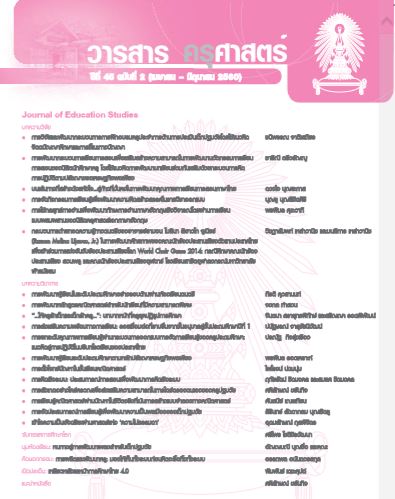การคิดเชิงระบบ: ประสบการณ์การสอนเพื่อพัฒนาการคิดเชิงระบบ
Keywords:
การคิดเชิงระบบ, การสอนเพื่อพัฒนาการคิดเชิงระบบ, SYSTEMS THINKING, TEACHING FOR IMPROVING SYSTEMS THINKINGAbstract
การคิดเชิงระบบเป็นทักษะทางปัญญาที่สำคัญสำหรับผู้เรียนในศตวรรษที่ 21 ผู้เรียนที่มีความสามารถในการคิดเชิงระบบ เป็นผู้ที่สามารถมองลึกลงไปเกินกว่าเหตุการณ์ที่กำลังเกิดขึ้นและเป็นการมองให้เห็นถึงโครงสร้างของเหตุการณ์นั้น การคิดเชิงระบบเป็นการมองแบบองค์รวมและเห็นความเชื่อมโยงขององค์ประกอบต่างๆ ตลอดจนความสัมพันธ์เชิงเหตุและผลที่ส่งผลกระทบต่อกันและกัน ซึ่งจะช่วยให้บุคคลมีความเข้าใจปัญหาและโครงสร้างของปัญหาอย่างลึกซึ้ง และนำไปสู่การตัดสินใจแก้ปัญหาที่แปลกแตกต่างไปจากเดิม โดยเป็นการแก้ปัญหาที่ไม่ส่งผลกระทบให้เกิดปัญหาใหม่หรือไม่ทำให้ปัญหารุนแรงกว่าเดิม การคิดเชิงระบบไม่สามารถพัฒนาขึ้นได้เองตามธรรมชาติ แต่การคิดเชิงระบบต้องได้รับการพัฒนาอย่างเป็นรูปธรรม อย่างไรก็ตามการจัดการเรียนการสอนเพื่อพัฒนาการคิดเชิงระบบในการศึกษาไทย ยังไม่ถูกกล่าวถึงอย่างกว้างขวาง บทความนี้จึงมีวัตถุประสงค์เพื่อนำเสนอเกี่ยวกับมโนทัศน์ของการคิดเชิงระบบ และแนวทางการจัดการเรียนการสอนเพื่อส่งเสริมการคิดเชิงระบบรวมทั้งนำเสนอประสบการณ์ในการจัดการเรียนรู้เพื่อพัฒนาการคิดเชิงระบบในสถาบันการศึกษา
Systems thinking is an important cognitive skill for students in the 21st century. Students possessing systems thinking abilities are individuals who can look deep beyond emerging situations and see through the structure of these situations as well. Systems thinking is the process of looking at things as a whole and seeing the connections of their components as well as cause and effect relationships that impact each other. This would help people deeply understand problems and their structures and also lead to different decisions in problem-solving compared to conventional methods. Such problem solving does not affect the emergence of new problems or make the problems more severe. Systems thinking cannot develop human nature but does develop systematically and concretely. However, instructional management for developing systems thinking in education in Thailand has not yet been addressed largely and clearly. The purposes of this article are to describe the concept of systems thinking and present the ways of managing learning activities to improve systems thinking as well as to present teaching experiences for improving systems thinking in educational institutes.




